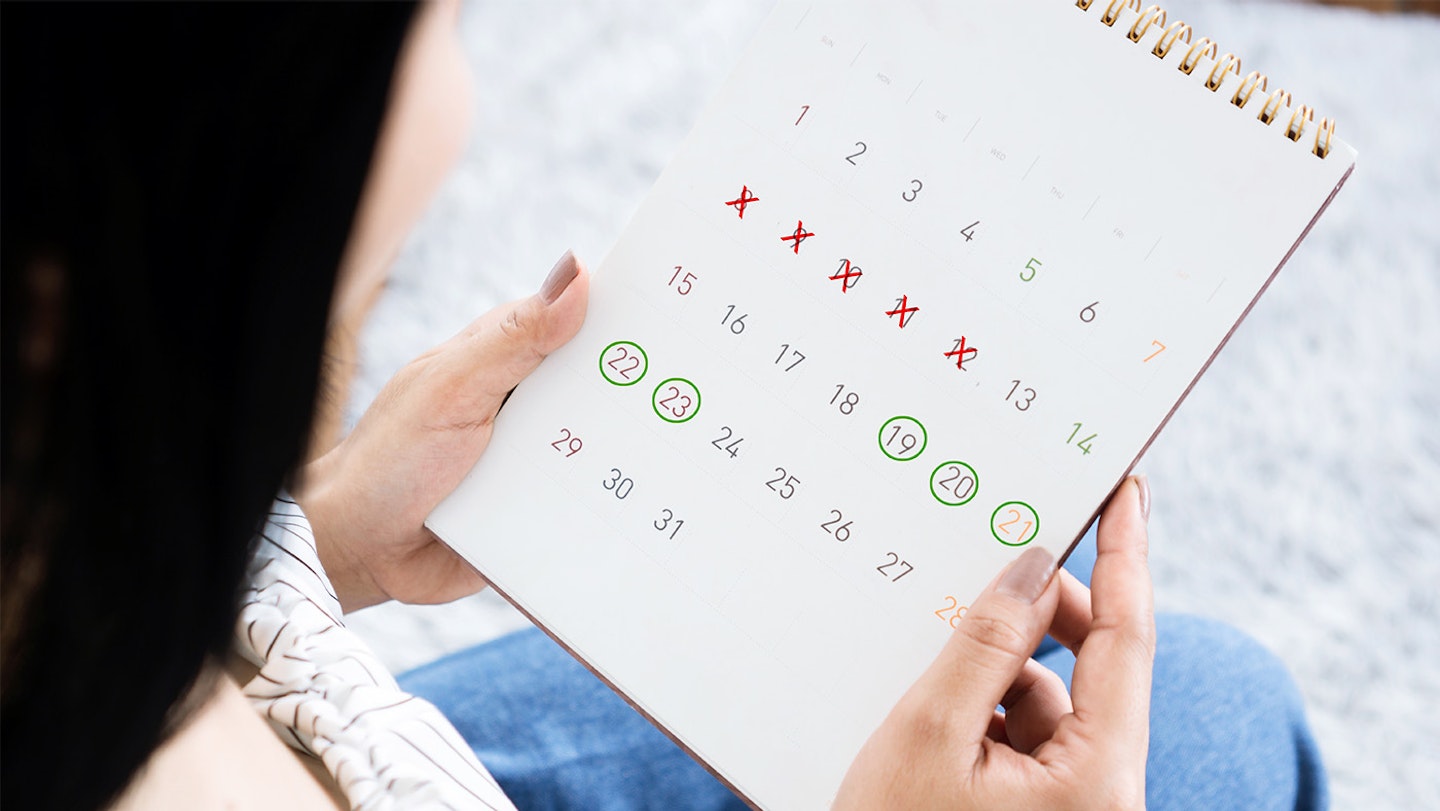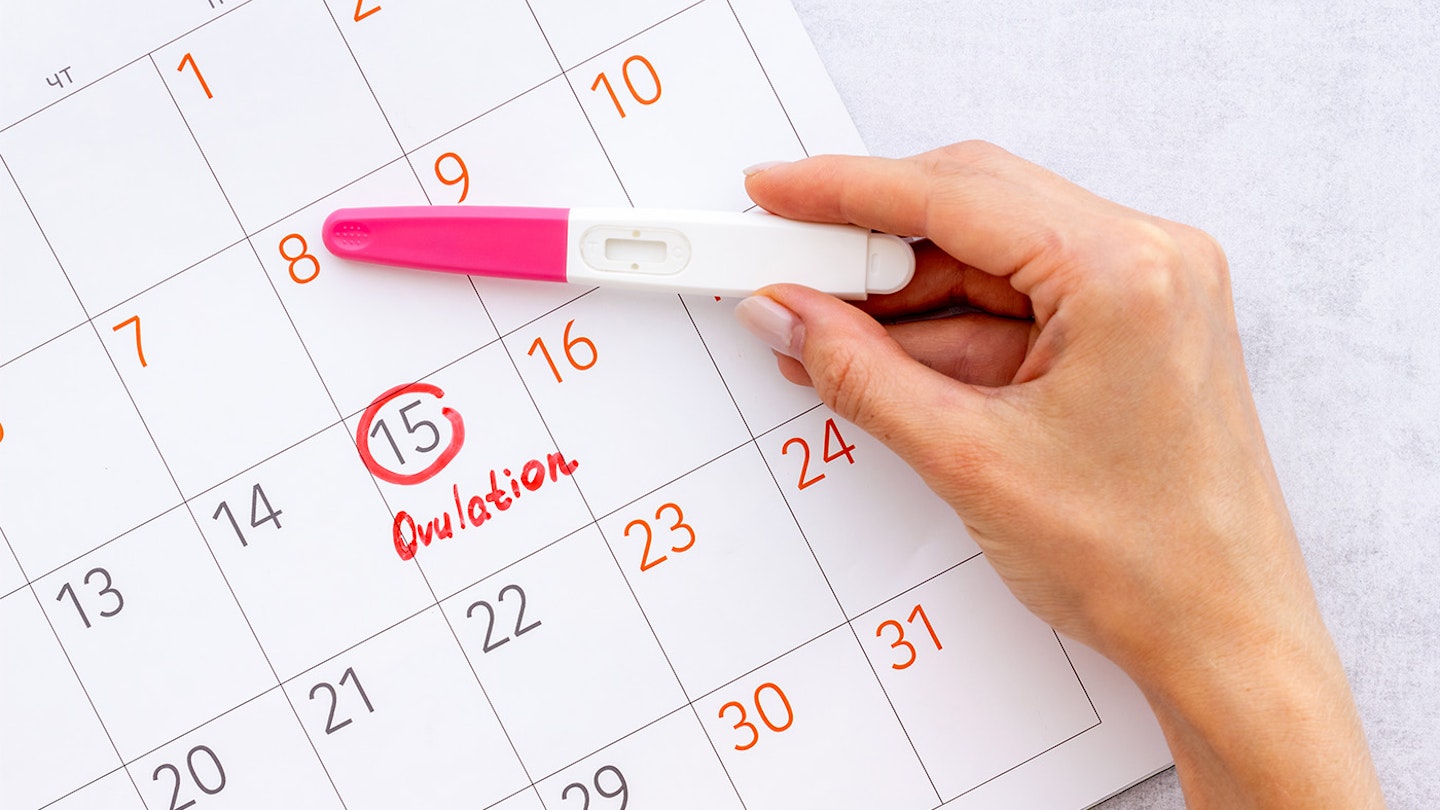Medically Reviewed by: Sandy Christiansen
When you decide to start trying for a baby, the first thing most of us will do is look at tracking ovulation, whether that's by using an ovulation calculator or ovulation test strips. But sometimes, for various reasons, late ovulation can occur, making it trickier to work out when exactly you should be trying to conceive.
We spoke to Dr Shazia Malik, Consultant Obstetrician and Gynaecologist at The Portland Hospital (part of HCA Healthcare UK) and Sandy Christiansen, Lead Fertility Coach & Clinical Embryologist at Béa Fertility, to find out more about late ovulation including causes and when to seek help.
What is late ovulation?
Ovulation is the release of a mature egg from an ovary each month during the menstrual cycle. It's triggered by the monthly fluctuation of certain hormones, namely: a gonadotropin-releasing hormone which causes the pituitary gland in your brain to produce follicle-stimulating hormone and luteinising hormone.
Everyone’s menstrual cycle is different. On average, ovulation typically occurs around day 14 of the cycle, but it varies from person to person. Late ovulation is considered to be when ovulation occurs after day 21 of your menstrual cycle.
Late ovulation symptoms
There are multiple symptoms of ovulation to look out for and track against your cycle – however, some people don’t experience noticeable symptoms, so it can be tricky to detect on your own. This can mean that it can be hard to see the signs of late ovulation – until you start to take more of an interest in this information, such as when you're trying to conceive.
Symptoms of ovulation
• A rise in body temperature (basal body temperature)
• Higher libido
• A stitch-like pain, commonly known as ‘ovulation pains’ which can occur on either side of the body depending on which ovary has released the egg that particular month
• Changes in vaginal discharge (cervical mucus becomes clear and stretchy like a raw egg white)

Causes of late ovulation
Late ovulation can occur from time-to-time in almost any woman. Infrequent late ovulation is not typically a cause for concern, but if it’s consistently late it might it be worth investigating. When it comes to psychological stress and breastfeeding as a cause for late ovulation, the changes to menstruation and fertility are usually only temporary. In the case of an underlying medical condition, treatment can often restore normal ovulation and improve a person’s chances of conceiving.
Common causes of late ovulation include:
Stress
Extreme stress can cause late ovulation. This is because stress can have a noticeable effect on the menstrual cycle, including ovulation, due to its effect on hormonal balance.
Hypothyroidism
Having either an underactive or an overactive thyroid can cause problems with ovulation. Common symptoms are tiredness, weight gain and feeling depressed. The British Thyroid Foundation notes that "Once the over- or under-active thyroid is under control, there is no reason why you should not have a successful pregnancy and a healthy baby." Ideally TSH levels should be below 2.5mU/l before and during pregnancy, so it's important to let your doctor know if you're trying to conceive as they may need to adjust your medication.
Also known as an under-active thyroid, Hypothyroidism is when your thyroid gland does not produce enough hormones. Common symptoms are tiredness, weight gain and feeling depressed. The British Thyroid Foundation notes that "Once the over- or under-active thyroid is under control, there is no reason why you should not have a successful pregnancy and a healthy baby." but it does note that it's important to let your doctor know if you're trying to conceive as they may need to adjust your medication.
Breastfeeding
According to a study published by the National Library of Medicine, "Breastfeeding has a demonstrable influence in inhibiting ovulation". This is because Prolactin (the hormone necessary for breast milk production), suppresses ovulation and menstruation. If you breastfeed exclusively - defined by the World Health Organisation as meaning that the baby receives only breastmilk - your period may stop altogether while you’re nursing. This is not to say you can’t get pregnant, as you can still ovulate from time-to-time.
Polycystic ovary syndrome (PCOS)
PCOS is a condition that can affect how the ovaries work and can disrupt the hormonal balance in the body. In some cases, luteinising hormone (LH) doesn’t surge to trigger ovulation, or excess levels of testosterone may prevent the ovaries from releasing an egg. There is treatment to counteract this when trying to conceive so it's worth talking to your GP.
Being overweight (obese) or underweight
Being in the obese BMI range can cause delayed or infrequent ovulation. This means that the womb lining has longer to become thicker, and can therefore also cause heavy periods. Weight loss, if it’s drastic or over a short period of time, can often impair the delicate balance of hormones between your brain and ovaries, so having a direct effect on ovulation. If you lose weight to the extent that your BMI is under the normal range (less than 18.5) you may experience either delayed ovulation or no periods at all.
Excessive exercise (especially running)
Too much exercise can play havoc with your hormonal balance – especially running (and this is not just because of weight loss). As with anything, a healthy balance is the key.
Medication
Certain hormonal medications or antidepressants, or medication for epilepsy or certain mental health conditions can affect ovulation – so it’s important to discuss these with your doctor.
Diabetes
If not well controlled, Diabetes can have an effect on your hormonal balance.
Perimenopause
It’s very common for your hormones to fluctuate in the years leading up to the menopause (when your periods stop completely). Perimenopause usually starts in your mid-40s, but it can occur earlier. If you’re concerned about entering perimenopause, you should make an appointment with your GP who can arrange for some investigations.
Chances of conceiving with late ovulation
Although late ovulation can be frustrating when trying to conceive, it doesn't necessarily mean that conception won’t occur later in the cycle. Many women who have irregular or late ovulation will successfully conceive.
As the ovulation will be less regular and it can be difficult to know if you ovulated late, it’s important to monitor the symptoms your body is showing. This way women can determine when they ovulate, enabling them to more accurately time sexual intercourse.
To monitor these ovulation symptoms, it might be helpful to use an ovulation app, to note and monitor a pattern in symptoms.
If your menstrual cycles commonly fall out of the normal range (21-35 days), then it’s advisable to seek investigation and advice from a specialist. It’s also really helpful to make sure that your weight, stress and exercise levels are as normal as possible – and having sex every other day gives you the best chance of conceiving.

Does late ovulation suggest poor egg quality?
Late ovulation could result in a lower quality egg that is released which can have an impact on chances of pregnancy. In addition, delayed ovulation may lead to a shorter luteal phase, which can hinder a successful implantation of a fertilised egg.
How does late ovulation affect menstruation?
If you have experienced late ovulation, you may experience heavy bleeding when menstruation occurs. In the first half of the cycle, oestrogen peaks, causing the uterine lining to thicken and swell. With late ovulation, oestrogen levels can be increased, causing the uterine lining to continue to grow.
So, when you then have a period (usually 14 days after ovulation), it’s likely to be heavier than normal as the womb lining is thicker than in a normal cycle.
When to see a doctor
It’s best to seek medical treatment if:
• Your period stops for an extended period (e.g., 90 days or more)
• Your periods have become irregular, or you are experiencing heavy bleeding
• You are experiencing severe pain during menstruation
• Your cycles are fewer than 21 days apart or more than 35 days apart
• You have struggled with health problems that are linked to fertility issues (such as endometriosis or PCOS)
• You’re concerned about your inability to conceive
• You’re experiencing hot flushes or sweats
• You’re experiencing bleeding between periods or after sex
• You think you might be on medication that can affect your chances of conceiving (or can have an impact on your baby). In this case, it’s important to discuss this with your doctor before you try to conceive.
Is there a treatment for late ovulation?
If you have an underlying condition, such as PCOS or hypothyroidism, treating these can help regulate the menstrual cycle and ovulation. However, if no cause can be determined, your doctor may suggest certain medications that help to regulate ovulation. Doctors may prescribe:
Letrozole - a fertility drug that stimulates the ovary to work to produce more follicles, helping the release of an egg
Clomiphene (Clomid) - a fertility drug that stimulates the hypothalamus, pituitary gland and ovary to increase the levels of hormones FSH and LH
Human Chorionic Gonadotropins (Pregnyl, Novarel) - HCG induces ovulation
If a treatment cannot be found, and you are trying to conceive, then an alternative method of conception, such as IVF, might be suggested as an alternative. Your doctor will be able to discuss the available options with you.
Medical professionals may recommend some immediate lifestyle changes to improve reproductive health and regulate your cycle:
• Avoid smoking and drinking
• Manage stress
• Use contraception to protect against STDs that can impact fertility
• Don’t over-exercise
• Maintain a healthy diet and weight
Can stress cause late ovulation?
Sandy Christiansen notes that "stress could be a possible cause for ovulating later in your menstrual cycle, but this can vary from person to person. There’s no conclusive evidence that stress affects your fertility, but reducing negative stress can be good for your overall health (and certainly make your day to day quality of life better!)."
Are there any ways to fix late ovulation naturally?
As noted above, your lifestyle may affect your ovulation and in some cases you may not need medical intervention to make ovulation more regular. Sandy explains that "changes in your lifestyle could impact your hormonal balance and optimise your ovulation. Nutrition, exercise and stress management can be important factors for your menstrual cycle. In addition, you should avoid smoking and reduce alcohol and caffeine consumption."
About the Expert
Dr Shazia Malik gained her medical degree in Obstetrics and Gynaecology in 1991. She has trained in Obstetrics in some of the largest tertiary level units in the country - her specialist training was undertaken in Cambridge, where she was also a research fellow funded by the MRC with a world-famous team looking at abnormal vessel function in women with excessively heavy periods or endometriosis.
Sandy Christiansen, MSc is an Embryologist and award-winning fertility coach with over a decade of experience working in fertility clinics around the world. She is a HCPC registered Clinical Scientist, ESHRE certified Clinical Embryologist and highly experienced fertility coach.
A journalist since 2015, Emily Gilbert is the Features & Reviews Editor for Mother&Baby and has written for the website and previously the magazine for seven years. Emily writes about everything from the top baby products to pregnancy, fertility and maternal mental health. Specialising in product reviews, Emily is the first to know about all the exciting new releases in the parenting industry.
